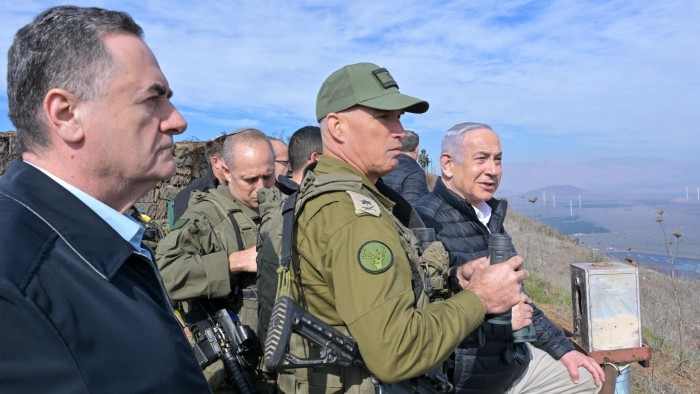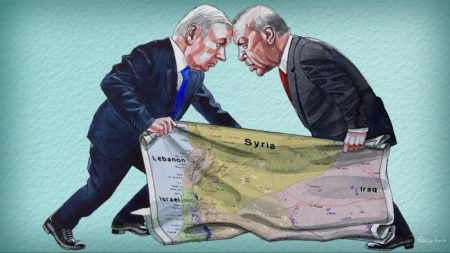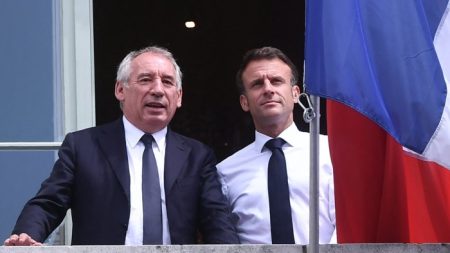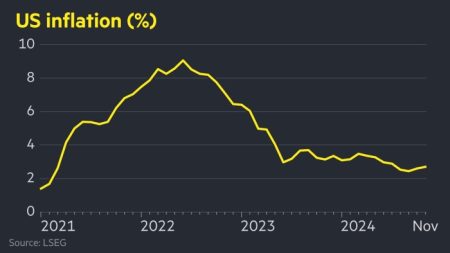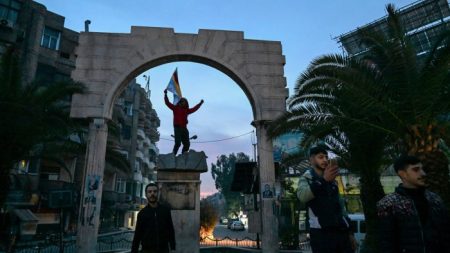Unlock the Editor’s Digest for free
Roula Khalaf, Editor of the FT, selects her favourite stories in this weekly newsletter.
Israel has taken more Syrian territory, justifying the incursion as a temporary move to protect its citizens but drawing a furious reaction in the region.
Defence minister Israel Katz on Monday said the country’s military was continuing to seize “high ground” inside Syria after the toppling of Bashar al-Assad’s regime on Sunday by a group led by the Islamist Hayat Tahrir al-Sham.
The movement of tanks and infantry, which extended into and beyond a previously demilitarised buffer zone, was condemned “in the strongest possible terms” by Egypt, which said it amounted to the “occupation of Syrian land” and a “severe breach” of a 1974 armistice deal.
Regional powers are scrambling to respond to the stunning 12-day offensive by HTS, once an affiliate of al-Qaeda, which led disparate rebel factions to overthrow the Assad dynasty on Sunday.
A wide swath of the Israel-Syria frontier had been governed by the 1974 armistice agreement, including a significant UN peacekeeping force to monitor the pact.
Israel’s Prime Minister Benjamin Netanyahu, visiting the border region on Sunday, said the agreement had “collapsed” after Syrian army units abandoned their positions, with Israeli forces taking them over “to ensure no hostile force embeds itself right next to the border of Israel”.
But, in a statement on Monday, the Egyptian foreign ministry said Israel’s recent actions had “exploited the . . . vacuum in Syria in order to occupy more Syrian land and to impose new facts on the ground in contravention of international law”.
It called on the UN Security Council and international powers to take a “firm position” towards “Israeli attacks” on Syria.
Other countries — both supporters and opponents of the toppled Assad regime — have also expressed concern that its fall could lead to further instability in the region.
Russia, which maintains naval and air bases in Syria, said it was “doing everything it can to get in touch” with the country’s new rulers.
Kremlin spokesperson Dmitry Peskov said Moscow would need “a serious conversation” about its military presence in Syria, state newswire RIA Novosti reported on Monday.
Amid the upheaval, the US has carried out over dozens of strikes against Isis targets in Syria while Turkey-backed Syrian fighters have battled Kurdish forces in the north of the country.
Israel itself was a bitter enemy of the Assad regime, which was allied with Iran and the Lebanon-based Hizbollah militia. But direct clashes between the two countries have been extremely rare since the 1980s.
Katz on Monday said Israeli troops would create a “security area” beyond the old buffer zone that would be clean of “heavy strategic weapons and terrorist infrastructure”.
As part of the incursion, Israeli commandos on Sunday seized a strategic Syrian military position at the highest point on the Golan Heights, known as Jabal al-Shaykh.
Israel has occupied most of the Golan Heights after capturing it from Syria during the six day war in 1967 and annexing it in 1981, though its claim over the land is not recognised internationally.
Katz added that Israel would make contact with locals in the area, including the Syrian Druze community, as well as continue strikes against Iranian operations to smuggle weapons to Lebanon-based Hizbollah.
The Israeli military has also been reinforcing its border defences and digging trenches to halt any motorised infiltration attempts, while making clear that anyone who approaches Israeli positions would be fired on.
“Israel is seizing vantage points and deterring [the Syrian side] now,” said a person familiar with developments. “Israel doesn’t want to intervene, but due to the proximity [of what’s happening across the border in Syria] this is an Israeli interest.”
Israel hit suspected chemical weapons sites in Syria with air strikes over the weekend, in a bid to destroy Assad regime capabilities before they fell into rebel hands, foreign minister Gideon Sa’ar said on Monday.
Israeli warplanes have conducted numerous sorties against such “strategic weapons” since the rebel offensive in Syria began two weeks ago, said the person familiar with developments inside the country. Such capabilities “should not fall into the wrong hands”, the person added.
On Monday, Katz directed the military to continue striking “throughout Syria” to destroy weaponry including “surface-to-air missiles, air defence systems, surface-to-surface missiles, cruise missiles, long-range rockets and land-to-sea missiles”.
Multiple air strikes were reported on Sunday and into Monday across the country, including on a security complex and air bases around Damascus, as well as the southern cities of Dara’a and Suweidah.
Commenting on the Israeli incursion into Syrian territory for the first time in more than five decades, Netanyahu said: “This is a temporary defensive position until a suitable arrangement is found.”
Additional reporting by Max Seddon in Berlin
Read the full article here



